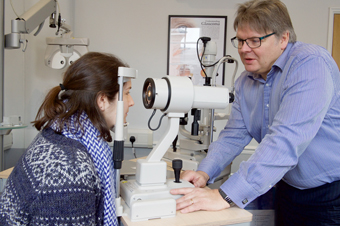
Well, this isn’t a quiz question but an issue that’s very important to us here at BBR Optometry where we strongly believe in the important role primary eye care plays in preventing the need for surgical procedures and want people to be more fully aware this National Eye Health Week (September 18-24) of their options for treatment.
In simple terms, ophthalmologists are eye surgeons while optometrists are family eye doctors who specialize in primary eye care, dispensing spectacles and contact lenses as well as treating and managing eye diseases.
Nick Rumney, BBR chairman, explains: “Some 40 years ago the two professions were treated as very different with ophthalmology very much focused on medical and surgical aspects of eye care, while optometry was almost completely focused on prescribing.
“Over the past four decades, however, the scope of optometry and optometric education has expanded significantly with many optometrists now well qualified to treat and manage a wide range of eye diseases.
“Here at BBR Optometry, we are at the forefront of this advancement and I work with a team of four fellow optometrists to ensure all of our patients receive the best possible eye care and can often avoid the need for eye surgery.
“Myself, Laura Reece and Laura Nixon have all completed the Independent Prescribing course while Jessica MacIsaac is also currently undergoing her training so we will then have four optometrists qualified to clinically assess patients and establish a diagnosis.
“We can then determine the clinical management required and prescribe medication, where necessary, saving unnecessary referrals to hospital. I really see this as the future for optometry.
“Eye diseases such as glaucoma, macular degeneration and diabetic retinopathy can all be treated at our practice and we also have our new Tear Clinic which specialises in diagnosing the growing number of patients we are seeing with ocular surface disease.
“Obviously dispensing remains important to us as a practice because many conditions such as short-sightedness, long-sightedness and astigmatism can be corrected with spectacles or contact lenses.
“But even here we still like to offer the latest developments such as bespoke spectacles from iconic British designer Tom Davies as well as MiSight from CooperVision, the first lenses clinically proven to slow the progression of myopia and reduce the risk of many sight-threatening conditions.
“Laura Reece also specialises in Orthokeratology where patients wear customised contact lenses while they sleep and can then enjoy perfect natural vision all day without the need for prescription spectacles, contact lenses or laser eye surgery,” he added.
BBR Optometry is also proud of the practice’s close working links with ophthalmologists who are based at the Victoria Eye Unit and believes the two professions should be seen as a partnership that benefits patients rather than working separately.
Nick explains: “Supported by these colleagues at the NHS Hospital Eye Service, the Primary Eyecare Acute Referral Scheme (PEARS) scheme we operate for patients who have a Herefordshire GP has seen attendance at A&E fall by more than 5% and, even more importantly, saved the sight of many patients.
“As qualified Independent Prescribers we are able to help people with issues that are health, rather than vision related, such as red eyes, sore eyes, or even a foreign body in the eye, saving unnecessary visits to hospital and freeing up the time of ophthalmologists for cases that need surgical intervention.
“Some issues, such as cataracts, will require surgery but even then we can also support patients after they have undergone procedures by advising them on the best possible after care,” he added.
